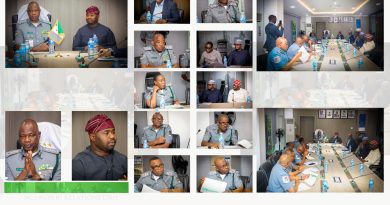FG Moves to Secure Digital Economy, Strengthen Cyber Defence — NITDA DG
FG Moves to Secure Digital Economy, Strengthen Cyber Defence — NITDA DG
By Alabidun Shuaib AbdulRahman
The Federal Government says it is taking decisive steps to safeguard Nigeria’s digital economy by strengthening cybersecurity systems, improving infrastructure, and building human capacity to harness the opportunities of Artificial Intelligence (AI).
The Director-General of the National Information Technology Development Agency (NITDA), Kashifu Inuwa Abdullahi, stated this at the Cyber Nigeria Summit organised by the Cybersecurity Experts Association of Nigeria (CSEAN), where he delivered a keynote address titled “Securing Digital Economy: Strengthening Infrastructure and Harnessing the Power of Artificial Intelligence.”
Inuwa described the digital economy as the “heartbeat of Nigeria’s development agenda,” noting that while the ICT sector contributes about 17 per cent to the country’s GDP, digital technologies now influence almost every sector.
He said the service sector alone accounts for 58 per cent of national output, underscoring the extent to which digital tools shape daily activities and business operations.
READ ALSO: Ex-FCTA Director, Duku Bags 24-Year Jail Term for ₦318m Fraud
The NITDA boss, however, warned that the rapid rise of AI has also transformed the cybersecurity landscape.
While AI enhances innovation and efficiency, he said, it also empowers cybercriminals with advanced tools for more precise and large-scale attacks.
“Cybercrime now costs the world over $10 trillion annually, making it the most profitable form of crime globally,” Inuwa said.
“The World Economic Forum ranks cybersecurity among the top five global threats, showing that our strategies must evolve beyond traditional defences.”
He noted that securing Nigeria’s digital future must begin with building infrastructure that prioritises security from the ground up.
“Digital infrastructure now goes beyond servers and networks; it includes utilities, telecommunications, and even autonomous vehicles. If a hacker gains access to an autonomous car, the consequences could be disastrous,” he warned.
Inuwa explained that AI systems rely on three key components — data, compute power, and algorithms — all of which must be protected to prevent vulnerabilities.
On human factors, he said 90 to 95 per cent of cybersecurity breaches result from human error, adding that the statistic has remained the same for two decades despite global awareness efforts.
“Cybercriminals exploit human weakness because it’s easier to manipulate behaviour than to hack advanced systems,” he said.
According to him, Nigeria’s cybersecurity framework rests on four pillars — governance, capacity building, incident management, and collaboration.
He said the Cybercrime Act, which has been updated to reflect modern realities, provides the legal foundation for coordination, while a Presidential Executive Order designates critical digital infrastructure as national assets.
“This milestone means our cyberspace is now recognised and protected as part of Nigeria’s national highway,” he added.
On capacity development, Inuwa noted that the global demand for cybersecurity professionals currently exceeds 4.4 million, with over 140,000 openings in Nigeria alone.
He said the government’s 3 Million Technical Talent (3MTT) Programme, alongside the Digital Literacy for All Initiative and the National Digital Literacy Framework (NDLF), is aimed at bridging that gap.
“Our goal is to achieve 95 per cent digital literacy by 2030 and 70 per cent by 2027,” he said, adding that digital literacy, including cybersecurity, will soon be taught from kindergarten through tertiary institutions.
On incident management, the NITDA boss disclosed that the National Cybersecurity Coordination Centre (NCCC) under the Office of the National Security Adviser (ONSA) is now fully operational, coordinating responses to cyber threats across the country.
He added that sector-specific Computer Emergency Response Teams (CERTs) have been established in finance, communications, and law enforcement sectors.
He stressed the importance of collaboration, saying Nigeria works with the African Union, Smart Africa, international CERTs, and global tech firms to strengthen collective cyber defences.
He urged Nigerians to maintain good cyber hygiene by using strong passwords, enabling multi-factor authentication, and avoiding phishing scams.
Inuwa further revealed that NITDA, in partnership with the ONSA, is developing a National Cybersecurity Architecture to improve coordination, accountability, and information sharing across agencies.
“Our digital economy cannot thrive without security,” he said. “By combining innovation with vigilance, Nigeria will build a safe, inclusive, and resilient digital future.”




